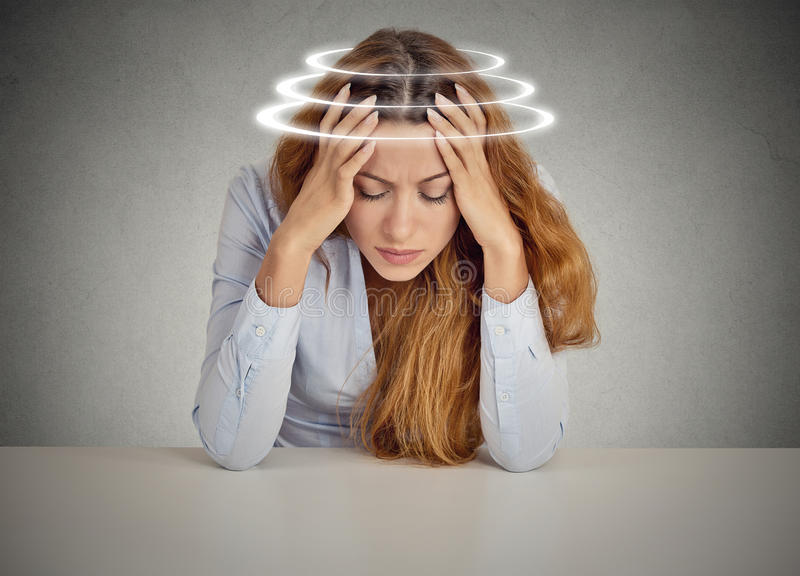Dizziness or vertigo is not a disease, but a symptom that occurs in a number of very different diseases, causing the patient to disorientate in space, a false sensation of mobility of objects and stationary objects relative to him or the person himself relative to the objects around him. It is extremely common, especially among elderly patients and females: in terms of the frequency of medical complaints, it is in second place after headache.
The diagnosis of vertigo is difficult, since the sensation of instability in space is extremely subjective and can differ significantly in different patients both in the degree of manifestation and in the sensory phenomena that arise in this case.
Status description
The condition can arise suddenly, be of an episodic nature: the patient experiences something like a jolt, as if he is “led” to one side. In other cases, there may be a feeling of movement of surrounding objects in a circle or a feeling of rotation of the person himself, as after a long spin on a carousel. This state can persist long enough, up to an hour. But more often dizziness is expressed in a feeling of general instability of objects and the person himself, a violation of the sense of balance. The patient experiences uncertainty when walking, it seems to him that he is about to fall or stumble, the earth is slipping from under his feet. Sometimes the symptoms become so severe that the patient grasps objects and feels lightheaded, as before losing consciousness.
When should you see a doctor immediately?
- First-time dizziness, accompanied by nausea, vomiting, or headache
- Dizziness led to loss of consciousness
- Weakness, tremors (tremors) of the extremities, tachycardia, sweating, feeling of lack of air, chest pain
- The condition lasts more than an hour
- Along with dizziness, sensitivity or weakness in one half of the body, face, or limb has sharply decreased
These symptoms indicate the possible development of an emergency and require urgent medical attention.
Causes of Vertigo or Dizziness

Three disorders are responsible for most of the dizziness diagnosed: benign paroxysmal positional vertigo (BPPV), vestibular neuritis and Meniere’s disease.
- BPPV, or benign paroxysmal positional vertigo, results from the presence of small crystals (otoliths) in one of the semicircular canals of the inner ear, which affect the perception of movement. Quite violent, but brief, these vertigo are usually triggered by rapid changes in position (getting up, turning your head quickly, etc.). They are the most common cause of dizziness.
- Vestibular neuritis refers to inflammation of the vestibular nerve, most often of viral origin. It is expressed by a single large, vertiginous seizure (lasting several days) which forces the person to remain bedridden. It is often accompanied by nausea and vomiting.
- Meniere’s vertigo, which mainly concerns people with a particular psychological context (suffering from stress, anxiety, emotional shock, obsessive disorders, etc.), causes severe, rotating attacks of vertigo, lasting 2 to 3 hours, which are accompanied by intense neurovegetative signs (nausea, vomiting, sweating, diarrhea).
Meniere’s disease is a chronic disease of the inner ear responsible for dizziness and ringing in the ears. It occurs suddenly, affects women between 20 and 60 more frequently, but can be seen at any age, in both sexes. It is exceptional in children and adolescents.
Causes of peripheral dizziness
- Infection of the labyrinth secondary to an infection of the ear ( chronic otitis );
- Ménière’s disease;
- Inflammation of the nerve (neuronitis);
- Disorders of the vessels supplying the ear;
- Inner ear trauma;
- Toxic or drug-induced causes.
Read trending contents on EVOKING MINDS
What kind of diagnostics can be prescribed by a doctor?
To determine the type of dizziness and its possible causes, it is necessary to perform laboratory and instrumental diagnostics. It:
- cardiogram
- blood tests (general, biochemical, for coagulability)
- Ultrasound of the vessels of the head and neck
- MRI or CT of the brain
Drug therapy

- In case of circulatory disorders, drug therapy will include the intake of vasodilators and antihistamines and drugs that improve the rheological properties (fluidity) of the blood
- Neurogenic dizziness requires taking nootropics (Picamilon, or gamma-aminobutyric acid), which improve blood circulation and nerve conduction
- Vertigo caused by osteochondrosis requires taking muscle relaxants to relieve muscle spasm
- In women, the treatment of dizziness caused by menopausal changes or irregularities in the cycle is carried out with hormonal drugs, which make it possible to return the hormonal background of the body to normal.
Mode. It boils down to adherence to the daily routine, the correct alternation of mental and physical exertion, sleep and wakefulness.
Diet. Eliminates the use of products that increase blood pressure and cause vasospasm, stimulating the nervous system (coffee, strong tea, alcohol, nicotine, very salty or spicy foods).
Gymnastics. To train the vestibular apparatus outside of an attack, it is recommended to perform some exercises:
- Rotation of the head, body from side to side with closed and open eyes
- Swinging on a swing with a gradual increase in amplitude
- Balance exercises (one-legged stand with eyes open and closed)
- Rotation of the eyes in different directions
- Swimming
Treating vertigo at home

If vertigo attacks occur intermittently and the cause is known, you can relieve the symptoms yourself using the following techniques:
- If your head is waking up dizzy suddenly, tilt your head forward and exhale completely
- In a sitting position, bend over to the knees, maintain the position until symptoms stop
- Take a stable position (sitting, rest your legs apart on the floor) and focus your gaze at one point on a stationary object
- Splash cold water on your face
- Inhale the vapors of ammonia
- Drink some hot sweet tea
- In the future, care should be taken when changing the position of the body: slowly lie down, bend over and get up
Benefits of treatment at MEDSI
- Reception is conducted by qualified neurologists with extensive practical experience
- The clinics are equipped with equipment that allows for a complete diagnosis of vertigo
- Assisting with dizziness emergencies
Read:
2. Are Broiler Eggs Good For Your Health Or Not? Properties, Benefits, Which Ones To Choose



